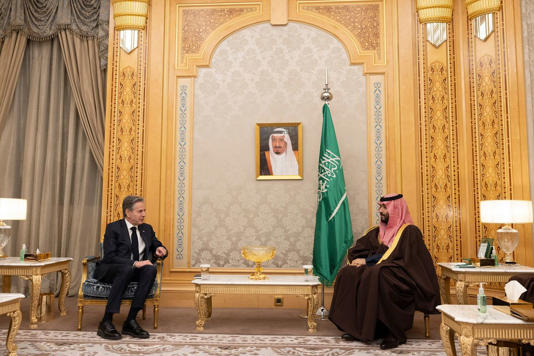
Saudi Arabia’s Plan B for a Stronger Saudi-US Relationship and Regional Balance
by Dr. Turki Faisal Al Rasheed
The Saudi-US relationship plays a vital role in promoting stability and cooperation in the Middle East. To enhance this alliance, Saudi Arabia is proposing a Plan B that focuses on mutual interests, without exclusive involvement of select groups. This article explores the significance of a Saudi-American agreement that does not involve Israel and emphasizes the need to engage with a pragmatic approach.
Saudi Arabia recognizes the challenges posed by an extremist Israeli government and the historical instances where agreements were invalidated or unimplemented. Despite the lack of progress in Gaza and the occupation of Palestine, Riyadh believes in the importance of engaging with Washington without direct Israeli involvement. Saudi Arabia has presented the Arab Peace Initiative with Israel in 2002, displaying its commitment to regional peace even before Hamas took power.
The proposed agreements between the US and Saudi Arabia focus on security cooperation, technology sharing, and a broader Middle East resolution. These agreements include a bilateral defense treaty, assistance in building a civilian nuclear reactor, and collaboration in emerging technologies such as artificial intelligence. The aim is to strengthen the Saudi-US partnership while seeking a resolution to broader regional challenges.
Saudi Arabia’s plan to build a large-scale nuclear power plant as part of its energy diversification agenda has faced delays due to political instability in the region. The ongoing conflicts between Israel, Palestinians, and neighboring countries have contributed to the extended procurement timeline for the Duwaiheen nuclear plant project. However, the commitment to energy diversification remains a priority for Saudi Arabia.
During President George W. Bush’s visit to Riyadh in 2008, the United States made a historic promise to support Saudi Arabia in developing civilian nuclear power for various purposes, including medicine, industry, and power generation. This promise reflects the long-standing commitment between the two countries.
To move forward, Saudi Arabia is considering a specific Plan B that excludes Israeli involvement. This plan focuses on defense collaboration, the construction of a civilian nuclear reactor, and advancements in technology. Diplomatic normalization with Israel could be on the table in exchange for acceptance of a two-state solution and an end to the occupation, based on the Arab Peace Initiative of 2002.
While progress on the US-Saudi agreements remains uncertain, the Biden administration views closer alignment with Saudi Arabia as a strategic win to counter Russian and Chinese influence in the region. However, challenges may arise without Senate approval and Israeli participation, potentially impacting the lasting success of the deal. Concerns about Saudi commitments on issues such as Iranian expansionism and competition with China also raise questions in Congress.
The evolving geopolitical landscape necessitates a reevaluation of international alliances, including the Saudi-US relationship. Saudi Arabia’s strategic plan emphasizes the importance of common interests and balancing relationships with other regional and global powers. By acknowledging the changing dynamics and focusing on energy, stability, and regional growth, Saudi Arabia and the US can forge a partnership that promotes peace, prosperity, and sustainable development in the region and beyond.
About the author:
Dr. Turki Faisal Al Rasheed is a renowned scholar focusing on Saudi Arabia’s transformation with a keen interest in uncertainty & sustainability. His research delves into the future challenges and opportunities.
X: @TurkiFRasheed

A strong article highlights the proactive leadership of Saudi Arabia in proposing a comprehensive plan that supersedes the extreme right-wing policies of the Israeli government.